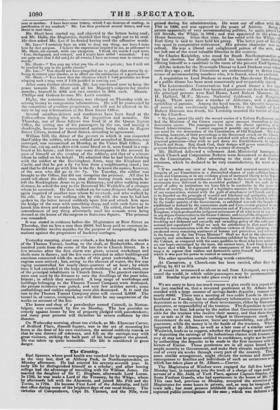Int Country.
Earl Spencer, whose good health was vouched for by the newspapers to the very last, died at Althorp Park, in Northamptonshire, on Monday afternoon. He had entered his seventy-seventh year. In early life he distinguished himself as a scholar ; and after leaving college had the advantage of travelling with Sir William Jones. He married the daughter of Sir C. Bingham, afterwards Lord Lucan. In 1782, he was made a Lord of the 'Treasury, by the Whigs; whom he afterwards left with the Alarmists, and joined Mr. Pitt and the Tories, in 1794. He became First Lord of the Admiralty, and held that office during some of the brightest days of our naval history. The victories of Camperdown, Cape St. Vincent, and the Nile, were
--- gained during his administration. He went out of office with hle Pitt in 1800, and was opposed to the peace of Amiens. Being r person apparently of very accommodating politics, he again joined old friends, the Whigs, in 1800; and was appointed to the tlace Home Secretary. Since that time, he has voted with the Whigs, ; nd Earl Grey is said to have held his proxy. The latter part of his life was spent in comparative retirement. His private character wits ex. cellent. He was a liberal and enlightened patron of the arts, and has left one of the most valuable libraries in the country.
Sir Charles Knightley, who stood for South Northamptonshire at the last election, has already signified his intention of immediately offering himself as a candidate in the room of the present Earl Spencer.
All the tickets for the Newcastle Dinner to Lord Durham were taken some days ago ; and the Committee are endeavouring to devise some means of accommodating numbers who, it is feared, must be excluded.
A requisition to Lord Durham to meet the Manchester Reformers at a public dinner has been most numerously and respectably signed.
The Leicestershire Conservatives had a grand dinner a few days ago, in Leicester. About five hundred gentlemen sat down to dinner: the principal persons were Earl Howe, Lord Robert Manners, Mr. H. Milford, M.P., Messrs. Nathaniel Goldsmid, and Bougtton Leigh. There were also a number of Aldermen, and a plentiful sprinkling of parsons. Among the loyal toasts, the Queen's name was of course most vociferously applauded.; When the health of Lord Robert Manners was drunk, his Lordship sounded the tocsin of alarm' for the Church—.
" We have passed (he said) the second session of a Reform Parliament, and find the Ministers of the Crown cannot agree amongst themselves in tlitir destructive career. The consequence has been, the almost upsetting of tie blessed Administration. I cannot suppose it possible v set of men can le of one mind for the destruction of the Constitution of Old England. The irk alarming, however, of their proceedings is the threatened attack on the Church. There is no disguise; they will not be satisfied with what they call a redreb of practical grievances—they wish to pull down the Establishment, to separrte Church and State. But, thank God, their designs will prove unavailing; the gracious Declaration of the Sovereign is a tower of strength."
Mr. Halford delivered a vehement Anti-Ministerial harangue, in which Church and Corporation Reform were denounced as destructive to the Constitution. After adverting to the state of our &rein relations, which he declared to be very unsatisfactory, he went on to say- " If we confine our view at home, shall we find renewed security for the integrity of our Constitution in a diminished chance of rude collision bets,u Lords and Commons, or in any evidence given of increased liberty obis Maje.ty to act up to the gracious sentiments of his heart in the instance in which sentiments were delivered to the assembled prelates? Shall we seek 1;,: proof of safety to institutions we have felt to be conducive to the pee welfare of society, in the prospect of a legislative measure for the eouden.!. of our corporations, stained with the guilt of attachment to Church and to be founded on the principle of scandal and falsehood and malignity, eel' by the Corporation Commission? Shall our solicitude for the Church Inc a by the tender mercies of the Government, as exhibited towards the branch Li]; established in Ireland by the concessions made and Commission granted in ,ce: pliance with the enemies of British connexion and of Protestantism hi the Kingdom, which produced the indignant retirement of all who were in any in any degree Conservative in the former Cabinet, and roused the eloquent v Stanley to a withering and most contemptuous denunciation of the shanu.1 truckling and dishonest and cowardly and swindling policy of the collea,,e, scorned and repudiated? Shall we seek for satisfaction in that most Ca, unworthy communication with the rebellious violence of Irish agitation, awakened every remaining sentiment of honour and patriotism and self.rerpr in the bosom of the late Prime Minister? Shall we find in the character ma capacity and attachment to the Constitution exhibited by those who reniaiu: the Cabinet, as compared with the same qualities in those who have retired; are our hopes encouraged by the tears, the earnest tears, Lord Grey is repot to have shed while he deprecated the consequences of his own Reform, ma sougit to repress that restless and destructive spirit himself had evaded, which it was past his power to control or command ?"
The other speeches contain nothing worth extracting.
At Carnarvon, a Church-rate has been carried, after four dal polling, by 411 to 375.
A vessel is announced as about to sail from Liverpool, on a voyar round the world, in which cabin-passengers may be accommodated a 1501. Similar trips are to take place every six weeks !




















 Previous page
Previous page